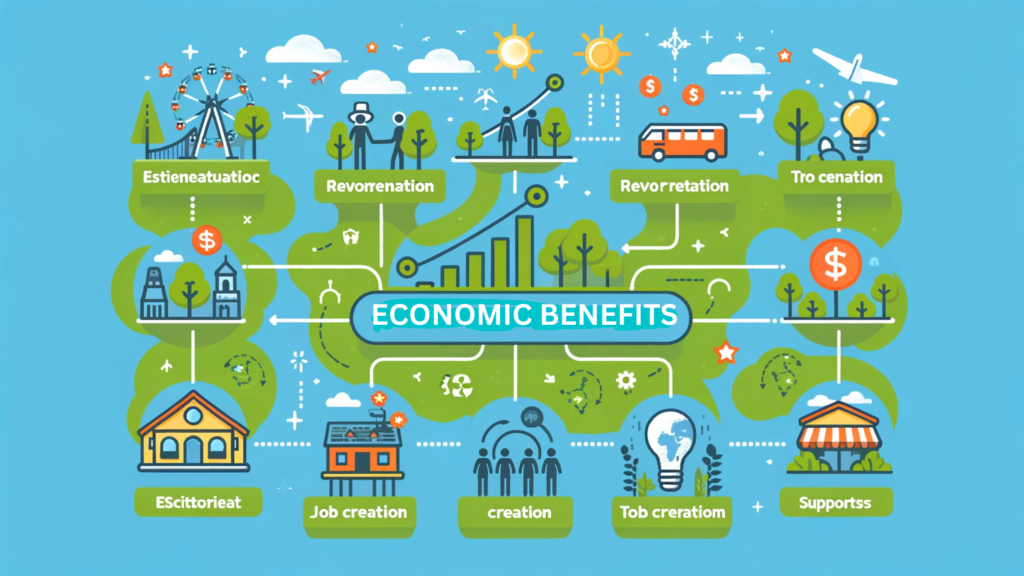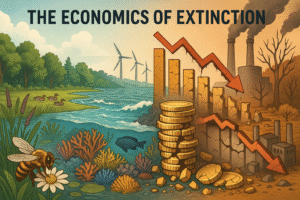In an era where travel is not just about exploring new destinations but also about making a positive impact, ecotourism has emerged as a beacon of hope. It stands at the intersection of adventure and conservation, offering a pathway to discover the world responsibly. Ecotourism, defined as responsible travel to natural areas, aims to conserve the environment and enhance the well-being of local communities. It’s not merely a way to experience the unparalleled beauty of our planet but a means to preserve it for future generations.
This form of tourism is gaining momentum as a sustainable development tool. It protects natural and cultural heritage, ensuring that visitors can enjoy pristine landscapes and rich traditions while contributing to local economies. Ecotourism’s growth reflects a broader shift towards sustainability in the travel industry, emphasizing the importance of protecting natural environments and supporting local communities.
As we delve into the economic impacts of ecotourism, we’ll explore how it generates revenue, creates jobs, and supports local businesses. But beyond its economic benefits, ecotourism fosters a deeper connection between travelers and the destinations they visit. It encourages a sense of responsibility and appreciation for the natural world, promoting conservation efforts and cultural preservation.
Join us on this journey as we uncover the essence of ecotourism and its role as a sustainable economic booster. Through responsible travel, we have the power to make a difference, ensuring that the wonders of our world remain vibrant and vital for generations to come.
The Economic Impacts of Ecotourism
The allure of ecotourism isn’t just in its ability to safeguard the environment and cultural heritage—it also plays a pivotal role in boosting economies, especially in areas where opportunities are scarce. By channeling tourism dollars into local communities, ecotourism serves as a vital source of income, fostering sustainable development and prosperity.

Revenue Generation: A Lifeline for Local Economies
Ecotourism transforms natural beauty into economic wealth. Entry fees to protected areas, guided tours, and eco-friendly accommodations funnel much-needed revenue into local economies. This influx of funds supports the maintenance of natural parks and reserves, ensuring they remain unspoiled for future visitors. Additionally, it provides the financial means for ongoing conservation efforts, directly contributing to the preservation of biodiversity.
Job Creation: Building Sustainable Livelihoods
The impact of ecotourism on employment cannot be overstated. From tour guides and lodge staff to artisans selling local handicrafts, ecotourism creates a multitude of job opportunities. These jobs often require specific knowledge or skills related to the environment, culture, or hospitality, leading to valuable training and capacity-building within communities. By offering alternative livelihoods, ecotourism helps reduce communities’ reliance on environmentally damaging activities such as logging or poaching.
Supporting Local Businesses: A Ripple Effect
The benefits of ecotourism extend beyond the tourism sector, stimulating growth across the local economy. Tourists’ expenditures on food, souvenirs, and other services ripple through the community, supporting a wide range of businesses. This not only boosts the local economy but also encourages the preservation of traditional crafts, cuisine, and culture. Small businesses thrive, entrepreneurship flourishes, and the entire community benefits from the sustainable development that ecotourism promotes.
A Catalyst for Infrastructure Development
Investment in ecotourism often leads to improvements in infrastructure, such as better roads, telecommunications, and visitor facilities. These enhancements not only make destinations more accessible and appealing to tourists but also improve the quality of life for local residents. Sustainable infrastructure development ensures that growth does not come at the expense of the environment, aligning with the principles of ecotourism.
Ensuring Long-Term Prosperity
The economic benefits of ecotourism are not just immediate; they lay the groundwork for long-term prosperity. By fostering a sustainable relationship with the natural environment, communities can ensure a steady stream of income that is not subject to the boom-and-bust cycles of extractive industries. This long-term perspective is crucial for regions where ecotourism represents one of the few sustainable economic opportunities.
Ecotourism is more than just a travel trend; it’s a transformative force that brings economic, social, and environmental benefits. As we move towards a more sustainable future, the role of ecotourism in driving economic development and conservation efforts will only grow in importance.
The Social and Environmental Benefits of Ecotourism
Ecotourism isn’t just a pathway to economic prosperity; it’s a beacon of hope for environmental conservation and social enrichment. By fostering an appreciation for the natural world and cultural heritage, ecotourism plays a critical role in the preservation of our planet’s treasures. Let’s explore the multifaceted benefits that ecotourism brings to the environment and communities around the globe.

Conservation at the Heart of Travel
At its core, ecotourism is about conserving the natural environment. The revenue generated from ecotourism activities—such as park entrance fees and guided tours—directly contributes to the protection and maintenance of protected areas. This financial support funds wildlife conservation projects, habitat restoration efforts, and the fight against poaching and illegal logging. By valuing the environment in economic terms, ecotourism creates a powerful incentive for conservation.
Empowering Local Communities
Ecotourism offers a sustainable development model that benefits local communities by providing alternative livelihoods and economic opportunities. It empowers residents by involving them in tourism activities, whether as employees, entrepreneurs, or partners. This involvement not only provides a source of income but also strengthens community ties and fosters a sense of pride in their natural and cultural heritage.
Education and Awareness: The Ripple Effect
A unique aspect of ecotourism is its focus on education and interpretation. Through guided tours, wildlife observation, and cultural exchanges, visitors gain a deeper understanding and appreciation of the natural world and local cultures. This educational component is crucial for raising awareness about conservation issues and promoting sustainable practices among tourists and locals alike. It creates a ripple effect, inspiring positive change far beyond the immediate vicinity of ecotourism sites.
Preserving Cultural Heritage
Ecotourism also plays a vital role in preserving cultural heritage. By showcasing traditional practices, languages, and arts, ecotourism helps maintain the cultural identity of indigenous and local communities. It provides a platform for cultural exchange, where visitors can learn about and appreciate the rich cultural diversity of their destinations. This mutual respect and understanding foster a more inclusive and empathetic world.
Promoting Environmental Stewardship
By highlighting the intrinsic value of the natural environment, ecotourism encourages both locals and tourists to become active stewards of the planet. It demonstrates the critical importance of sustainable living and environmental conservation in safeguarding our future. This stewardship mentality is essential for addressing global challenges such as climate change and biodiversity loss.
Ecotourism stands as a testament to the harmonious balance that can be achieved between human development and environmental conservation. It proves that travel and tourism can be forces for good, contributing to a more sustainable, equitable, and compassionate world.
Case Studies: Success Stories Around the Globe
The impact of ecotourism is not a mere hypothesis; it’s a reality demonstrated by numerous success stories from around the world. These case studies illustrate the transformative power of ecotourism, showcasing how responsible travel can lead to conservation triumphs, economic development, and the preservation of cultural heritage.

The Amazon Rainforest: A Model of Sustainable Tourism
In the heart of South America, the Amazon rainforest offers a prime example of ecotourism’s potential. Lodges and tours in the region emphasize minimal environmental impact and support for local communities. For instance, the Tambopata Research Center in Peru not only provides visitors with an immersive rainforest experience but also plays a crucial role in macaw conservation efforts. The economic benefits from tourism help fund research and conservation projects, demonstrating a sustainable model that values the forest’s biodiversity over logging or mining.
The Gorilla Safaris of Rwanda: Conservation and Community Development
Rwanda’s gorilla safaris in the Volcanoes National Park have become a global ecotourism benchmark. The country has successfully leveraged gorilla tourism to fund conservation efforts and community development projects. A portion of the tour revenue is reinvested into the local communities, improving living standards and providing alternatives to poaching. This initiative has not only helped increase the mountain gorilla population but also boosted the national economy.
Costa Rica: Pioneering Ecotourism
Costa Rica is often cited as an ecotourism pioneer, with its extensive network of national parks and protected areas. The country’s approach to ecotourism—integrating conservation, community involvement, and sustainable development—has made it a top destination for eco-conscious travelers. The revenue from ecotourism has funded conservation projects, contributed to the economy, and helped position Costa Rica as a leader in sustainable tourism practices.
The Galápagos Islands: Balancing Conservation and Tourism
The Galápagos Islands offer another compelling success story. Strict regulations limit the number of visitors and ensure that tourism activities are conducted in an environmentally responsible manner. These measures protect the islands’ unique biodiversity while providing a sustainable source of income for conservation and local communities. The Galápagos model illustrates the importance of regulation and management in preserving natural wonders for future generations.
Kenya’s Community-Based Conservancies
In Kenya, community-based conservancies have revolutionized wildlife tourism. By involving local communities in the management and benefits of conservation areas, these conservancies have fostered a sense of ownership and responsibility towards natural resources. This model has not only contributed to wildlife conservation but also provided economic benefits to local communities through ecotourism, demonstrating the potential of community engagement in conservation efforts.
These case studies underscore the profound impact ecotourism can have on both conservation and community development. By prioritizing responsible travel, environmental protection, and local empowerment, ecotourism continues to offer hope for a more sustainable and equitable future in tourism.
Challenges and Considerations in Ecotourism
While ecotourism offers a promising path towards sustainable travel and conservation, it is not without its challenges. As the popularity of ecotourism grows, so do the responsibilities and considerations to ensure its positive impact endures. Addressing these challenges is crucial for the continued success and integrity of ecotourism initiatives.

Balancing Growth with Conservation
One of the most significant challenges is managing the delicate balance between promoting ecotourism and preserving the natural environments that attract visitors in the first place. Increased foot traffic in sensitive ecosystems can lead to habitat degradation, wildlife disturbance, and pollution if not carefully managed. Implementing strict visitor limits, sustainable infrastructure, and environmental education can help mitigate these impacts.
Ensuring Equitable Benefits
Another critical issue is ensuring that the economic benefits of ecotourism are equitably distributed among all members of local communities. There is a risk that the influx of tourism dollars can lead to inequality, with benefits concentrated in the hands of a few rather than supporting the wider community. Developing community-based tourism initiatives and involving locals in decision-making processes are key strategies to promote equitable benefit sharing.
Maintaining Cultural Integrity
As ecotourism often involves close interaction with local cultures, there is a risk of cultural commodification or dilution. Ensuring that cultural experiences are respectfully and accurately represented requires ongoing dialogue with local communities. This involves giving communities control over how their culture is presented and ensuring that cultural tourism does not negatively impact their traditional ways of life.
Overcoming Economic Dependence
While ecotourism can provide significant economic benefits to areas with few other sources of income, there is a risk of creating dependence on a single industry. Diversifying the local economy and ensuring that ecotourism is just one of several income streams can help communities become more resilient to fluctuations in tourism demand.
Adapting to Global Challenges
Finally, global challenges such as climate change, pandemics, and geopolitical instability can have profound impacts on ecotourism. Developing adaptive strategies and resilient tourism models is essential to withstand these challenges. This includes embracing digital technologies, promoting local tourism, and implementing sustainable practices that reduce environmental impacts.
Navigating these challenges requires a collaborative effort among governments, tourism operators, local communities, and tourists themselves. By addressing these considerations, ecotourism can continue to thrive as a sustainable and responsible travel option that benefits both people and the planet.
How Can We Support Eco-Tourism?
Supporting ecotourism is about making conscious choices that promote sustainability, conservation, and the well-being of local communities. As travelers, industry professionals, or simply individuals committed to a healthier planet, there are numerous ways we can contribute to the growth and success of ecotourism.

For Travelers: Make Informed Choices
- Research Before You Go: Choose destinations and operators that are committed to genuine ecotourism principles. Look for certifications or memberships in reputable ecotourism organizations.
- Respect Local Cultures and Environments: Follow guidelines for responsible behavior in natural areas and cultural sites. This includes minimizing waste, conserving water, and respecting wildlife and local traditions.
- Support Local Economies: Purchase local products and services to help ensure that your tourism dollars benefit the community directly.
- Participate in Conservation Efforts: Engage in activities that have a positive impact on the environment, such as tree planting or beach clean-ups.
For Businesses: Embrace Sustainability
- Adopt Eco-Friendly Practices: Implement measures to reduce energy consumption, minimize waste, and conserve water in your operations.
- Educate Your Guests: Provide information on local conservation efforts and cultural heritage, and encourage guests to participate in sustainable practices.
- Partner with Local Communities: Develop partnerships that support local entrepreneurship and ensure that communities benefit from your business.
- Promote Conservation: Support local and global conservation projects financially or through awareness campaigns.
For Communities: Engage and Empower
- Develop Community-Based Tourism: Involve the community in tourism planning and decision-making processes to ensure that ecotourism development meets their needs and aspirations.
- Cultivate Local Ambassadors: Train community members to participate in ecotourism as guides, hosts, or entrepreneurs, showcasing their natural and cultural heritage.
- Foster Environmental Education: Implement programs that educate community members and visitors about the importance of conservation and sustainable practices.
For Policymakers: Create a Supportive Framework
- Implement Sustainable Tourism Policies: Develop regulations and incentives that promote sustainable tourism practices and protect natural and cultural resources.
- Invest in Infrastructure: Build sustainable infrastructure that supports ecotourism while minimizing environmental impact.
- Promote Ecotourism: Support marketing efforts that highlight sustainable tourism destinations and practices to attract responsible travelers.
Supporting ecotourism requires a collective effort to embrace sustainable practices, protect our planet’s natural and cultural treasures, and ensure that tourism benefits both the environment and local communities. By making informed choices and advocating for responsible travel, we can all contribute to a more sustainable and equitable world.
Conclusion: The Future of Travel is Green
As the sun sets on untouched landscapes and the stars begin to shine over conservation areas around the globe, we’re reminded of the essential role ecotourism plays in our world. It’s more than just a way to explore; it’s a path to preserving the planet’s precious resources, empowering communities, and fostering a deeper connection with our environment.

Ecotourism offers a sustainable alternative to conventional tourism, one that balances the needs of travelers with the imperative of conservation and community development. It challenges us to think about our impact, to make choices that support the health of our planet, and to engage with local cultures and ecosystems in respectful and meaningful ways.
The success stories we’ve shared highlight the potential for ecotourism to transform both destinations and the lives of those who visit and inhabit them. They serve as beacons of hope, proving that sustainable travel can and does make a significant difference. Yet, the journey doesn’t end here. The future of travel requires ongoing commitment, innovation, and collaboration from all stakeholders—travelers, businesses, communities, and governments alike.
As we look towards a green future, let’s carry forward the principles of ecotourism in all our travels. Let’s choose to be part of a movement that values our planet and its people, committing to travel in a way that respects and preserves the world’s natural beauty and cultural heritage for generations to come.
Thank you for joining us on this exploration of ecotourism. May your travels be enlightening, sustainable, and filled with the joy of discovery. Here’s to a future where every journey makes a positive impact.
Author’s Note: The journey towards sustainable travel is not a solo venture; it’s a collective effort that requires the participation and commitment of everyone involved in the tourism industry, as well as the travelers themselves. I encourage you to take the principles discussed in this blog post and apply them to your travels, your policies, or your business practices. Together, we can ensure that the beauty and diversity of our world are preserved for future generations to enjoy.
G. C., Ecosociosphere contributor.
References
- “How Does Ecotourism Help the Economy?” TouristSecrets. An insightful look into ecotourism’s economic benefits, from job creation to supporting local businesses.
- “The Economics Of Ecotourism: Private Profits And Social Benefits.” Faunalytics. A comprehensive study on the profitability and social benefits of ecotourism, with a focus on Tambopata, Peru.
- “What Is Ecotourism.” The International Ecotourism Society. An overview of ecotourism’s principles and its role in conservation and community empowerment.
- “Ecotourism and Protected Areas.” UN Tourism. The United Nations World Tourism Organization’s perspective on ecotourism and its importance for protected areas.
- “The Market Triumph of Ecotourism: An Economic Investigation of the Private and Social Benefits of Competing Land Uses in the Peruvian Amazon.” PLoS ONE. A detailed economic analysis of ecotourism versus alternative land uses in the Amazon.
This blog post is based on a variety of sources, including academic research, industry reports, and case studies. While I’ve endeavored to provide a comprehensive overview of ecotourism, I encourage readers to delve deeper into the topics and stories that interest them most. The field of sustainable travel is ever-evolving, and there’s always more to learn, explore, and implement.





Comments
I don’t think the title of your article matches the content lol. Just kidding, mainly because I had some doubts after reading the article.
Your article helped me a lot, is there any more related content? Thanks!
Your point of view caught my eye and was very interesting. Thanks. I have a question for you.
Your article helped me a lot, is there any more related content? Thanks!
Your point of view caught my eye and was very interesting. Thanks. I have a question for you.
Thanks for sharing. I read many of your blog posts, cool, your blog is very good.
Your point of view caught my eye and was very interesting. Thanks. I have a question for you.